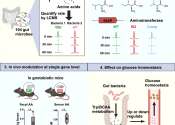Component of keto diet plus immunotherapy may reduce prostate cancer
Adding a pre-ketone supplement—a component of a high-fat, low-carb ketogenic diet—to a type of cancer therapy in a laboratory setting was highly effective for treating prostate cancer, researchers from the University ...
7 hours ago
0
23









